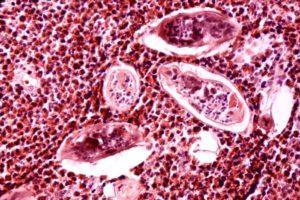
Histopathology of schistosomiasis haematobia, bladder. Public Health Image Library, NIAID, Image ID:35)
The commensal bacteria in the human body has been known to influence the prognosis and development of many diseases and conditions. The microbiota that dwell in the body comprise of viruses, bacteria, fungi and archeae which help maintain health. This study found that the microbes in the urinary tract of people infected with the Schistosoma haematobium parasite possessed unique microorganisms which induced inflammation.
Neglected tropical disease, Schistosomiasis, is caused by parasitic flatworms. These parasites are found in freshwater, snails and part of their life cycle includes stages that can survive in human organs. If Schistosoma haematobium eggs are located in the bladder, they can cause a number of urogenital problems including inflammation, fibrosis and bladder cancer.
Since Nigeria is a highly schistosomiasis endemic country and few studies have looked at the immune response towards urogenital schistosomiasis in this regions, researchers led by Yogesh Shouche investigated the microbiota profiles of urine from infected and uninfected individuals. They also wanted to understand the pathology-related to urogenital schistosomiasis.
The team recruited 70 participants from southwestern Nigeria. They screened morning urine samples for urogenital schistosomiasis infection and bladder pathology. They also carried out next-generation sequencing of the 16S region to analyse the microbial species found in the urine.
The researchers found that Proteobacteria and Firmicutes were found in both infected and uninfected individuals. Interestingly, the age and the gender of the participants influenced the composition of their microbial population. Individuals with urogenital schistosomiasis infection and bladder pathology contained bacterial species including Fusobacterium, Sphongobacterium and Enterococcus; which are all known to cause inflammation. Uninfected individuals contained taxa including Trabulsiela and Weissella; these bacteria being classified as markers for non-infected individuals.
Altogether, this study shows that certain bacterial species are more prevalent in individuals with urogenital schistosomiasis. This difference between infected and uninfected individuals can be manipulated into biomarkers and diagnostic tools. Providing probiotics with “protective” bacteria may also be a new treatment avenue for urogenital schistosomiasis and bladder pathology.
Journal Article: Adebayo et al.,2017. The microbiome in urogenital schistosomiasis and induced bladder pathologies. Plos Neglected Tropical Diseases
Article by Thandeka Moyo











